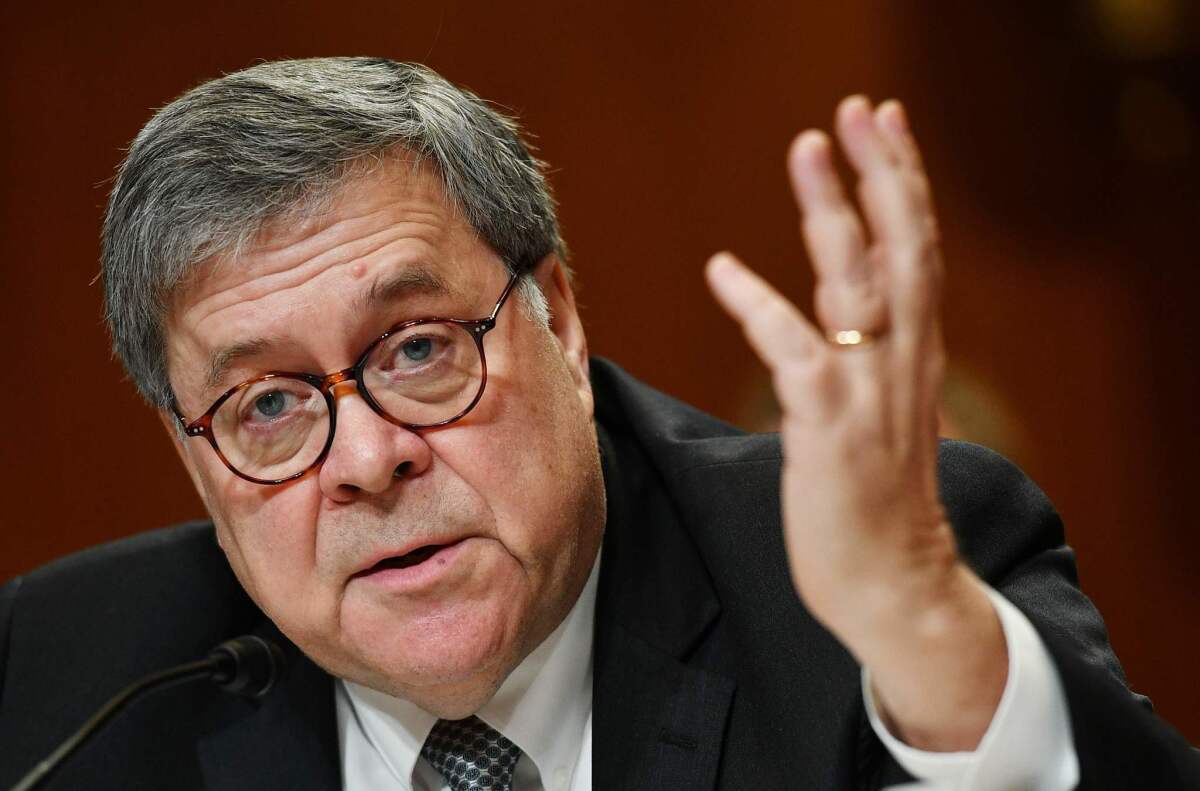Opinion: Resuming federal executions is a bad idea, so of course, that’s what Trump is doing

- Share via
The federal government has executed only four condemned prisoners since 1960. One was put to death in 1963, two — including Oklahoma City bomber Timothy McVeigh — in 2001, and one in 2003. Since that last execution by lethal injection at the federal penitentiary in Terre Haute, Ind., there has been a moratorium in action if not declaration, with 62 people sitting on the federal death row.
But on Thursday, Attorney General William Barr announced that the federal government will seek to resume executions later this year, with five ordered for December and January. While the announcement came as a surprise, the impulse should not, arising as it does from an administration that routinely exhibits a casual cruelty toward the poor, minorities and immigrants.
Perversely, the only federal executions since the Kennedy administration came under President George W. Bush, a president who, like Trump, made a show of his pro-life beliefs when it came to interfering in a woman’s right to control her own body, but not when it comes to the government killing its own citizens.
There will be legal challenges to the resumption of the federal executions. Barr instructed the Bureau of Prisons to amend the federal execution protocol, changing it from a three-drug process to a single lethal injection of pentobarbital, which several states also use despite assertions that some of the condemned said they felt a burning sensation as they slipped into unconsciousness.
That directive will likely wind up in federal court (where a separate challenge has been languishing for years), and I hope the challenges succeed. But even if the new protocol is struck down on regulatory grounds, capital punishment remains on the federal and several state books, and the Supreme Court has made clear that it sees the issue as a legislative matter despite its blatantly arbitrary application.
Debates over the propriety of the death penalty usually descend into duels over the nature of the crimes for which the convicted have been condemned — inarguably gruesome and inhumane — and the system itself. But those arguments don’t square up.
Yes, the crimes are awful, and it is human nature to seek revenge for them, but it’s who gets targeted for the death penalty that is problematic. And here the federal system is no better than our unjust state systems. Death sentences disproportionately fall on the poor, minorities and the mentally ill, arise more in some jurisdictions than others — the very definition of arbitrary application — and are reached through a process too easily manipulated by prosecutors and investigators, and swayed by errant witnesses.
“A pervasive myth is that the federal death penalty is ‘the gold standard’ of capital punishment systems, applied only to the worst offenders for a narrow class of especially heinous crimes involving unique federal interests, with highly skilled and well-resourced lawyers on both sides. This is false,” said Ruth Friedman, director of the Federal Capital Habeas Project. “In fact, the federal death penalty is arbitrary, racially-biased, and rife with poor lawyering and junk science.… These and other concerns, including troubling questions about the new execution protocol, are why there must be additional court review before the federal government can proceed with any execution.”
And the announced resumption comes as national support for capital punishment has been flagging, spurred in some measure by the growing roster of people — 156 and counting since 1973 — who have been exonerated and released from state death rows, in some cases after decades in prison. One study published five years ago by the Proceedings of the National Academy of Sciences estimated that at least 4% of those on death row were likely innocent of the crimes for which they have been convicted.
That failure rate, and the inordinate expense of prosecuting capital cases, has led to a growing movement among conservatives, as well, to end the barbarous practice.
“Resumption of executions by the federal government goes against the trend we have seen in states across the nation, where executions and sentences are at historic lows,” Hannah Cox of Conservatives Concerned About the Death Penalty said after Barr’s announcement. “A growing number of conservative state lawmakers are driving that trend because they realize that capital punishment goes against their principles of valuing life, fiscal responsibility and limited government, and that the death penalty does nothing to make the public safer.”
In fact, the death penalty achieves nothing its proponents say it does — other than the killing of a human being.
More to Read
A cure for the common opinion
Get thought-provoking perspectives with our weekly newsletter.
You may occasionally receive promotional content from the Los Angeles Times.










